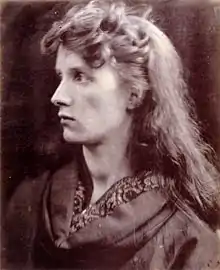Lady Clara Vere de Vere
"Lady Clara Vere de Vere" is an English poem written by Alfred Tennyson, part of his collected Poems published in 1842. The poem is about a lady in a family of aristocrats, and includes numerous references to nobility, such as to earls or coats of arms. One such line from the poem goes, "Kind hearts are more than coronets, and simple faith than Norman blood." This line gave the title to the film Kind Hearts and Coronets. Lewis Carroll's poem "Echoes" is based on "Lady Clare Vere de Vere".

Tennyson spent some time as a guest at Curragh Chase and wrote the poem to show his close friendship with the de Vere family.[1] Despite this, the poem is a scathing rebuke. The speaker tells that Lady Clara has rebuffed a young, but low-born man who loved her, and he committed suicide after her rejection. The references to coronets and earls are deployed ironically-- the poem's speaker is not, in fact, impressed with the Vere de Vere ancestry, and all of her noble claims can't balance out Lady Clara's coldness, pride, and idleness (as proven by the fact that she apparently has no better claim on her time than breaking hearts). The poem's speaker then professes a more democratic viewpoint, where good character is earned by virtue, not by high birth.
References in other works
In J. M. Barrie's play What Every Woman Knows, "Vere de Vere" is referred to as a slightly-cynical metaphor for "the noble nobility":
- COMTESSE. It seems to be no joke to you, Mr. Shand. Sybil, my pet, are you to let him off?
- SYBIL [flashing]. Let him off? If he wishes it. Do you?
- JOHN [manfully]. I want it to go on. [Something seems to have caught in his throat: perhaps it is the impediment trying a temporary home.] It’s the one wish of my heart. If you come with me, Sybil, I’ll do all in a man’s power to make you never regret it.
- [Triumph of the Vere de Veres.]
In C. J. Mathews' My Awful Dad (1881) the name Vere de Vere is used humorously as a stereotypical name of a member of the nobility: "You shall sit next to Evangeline Clara Vere de Vere, nee Tadpole, the grand double-jointed sentimental comic clog and pump dancer."
In the 1917 P. G. Wodehouse short story "The Romance of an Ugly Policeman," there is this passage: "Ellen Brown was a nice girl, but she had a temper, and there were moments when her manners lacked rather noticeably the repose which stamps the caste of Vere de Vere."
References
- Joyce, Mannix (1964). Adare and Its Poets (PDF). The Capuchin Annual. p. 330.